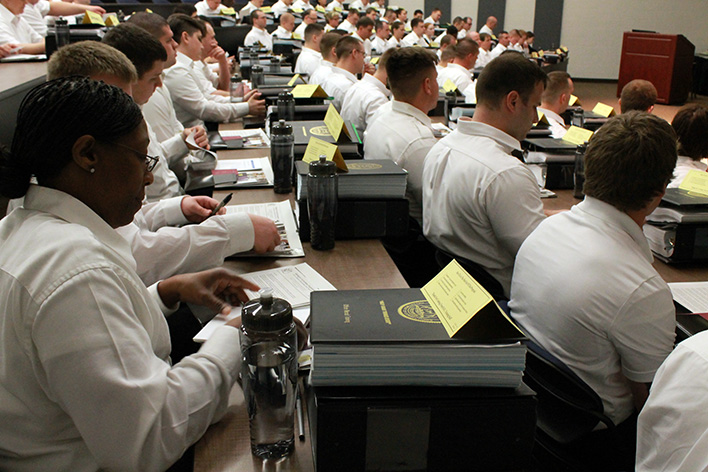
From CorrectionsOne: 5 challenges that blindside rookie COs
MDOC continues to hire hundreds of corrections officers to offset an average of 70 retirements every month. (Read more about the hiring surge in the Spring 2015 MCO Report).
Some new MCO members may benefit from the tips below. Good luck, new officers!
The following article originally appeared on CorrectionsOne, the most comprehensive and trusted online destination for correctional professionals nationwide, and is reprinted by permission of the CorrectionsOne editorial team. Visit www.CorrectionsOne.com to access news, commentary, education information, and training resources that help the corrections community.
By C1 Staff
Although it’s not easy being a correctional officer at any stage of your career, there are particular challenges that come with being a rookie. We asked our Facebook fans about the difficulties of the job for those just starting out. Here are five tips that can help you avoid getting blindsided.
1. It’s nothing personal.
Many of our users stressed the importance of remembering that you need to separate the job from yourself. Inmates will take our their anger and frustrations on you – it’s part of the job and you need to keep in mind that they aren’t talking to you as an individual, but simply to the uniform you are wearing.
“The inmates will say and do things to try getting under your skin, what else do they have to entertain themselves? If you can’t separate that from who you are, and what your job is, it is going to be a very tough job for you,” Carrie Lehmann wrote.
2. Keep up the count.
You are there, ultimately, to keep track of your inmates – and it’s a responsibility that you should be constantly aware of.
“Make sure your count is right at all times, even when it isn’t count time,” Jason Hill wrote. “If you have porters, outside trips, vocational workers, mess hall/main kitchen workers, or whatever it may be, know where they’re going. Know when and how many left your unit. Know which officer escorted them off your unit. And know when they’re coming back. When you relieve someone, always ask how many total inmates are on the unit, how many are physically present, how many are out, who is out, and where they are out to.”
3. Inmates are not your friends.
It’s easy to fall into the trap of becoming Officer Too-Friendly when inmates are nice to you, but remember that behind kind words are often ulterior motives. Don’t get drawn into the mind games inmates play that are masked by friendliness. Many of our users echoed the same mantra: firm, fair and consistent. Don’t make promises to inmates you cannot keep and never let the line between corrections officer and inmate become blurred. You have authority over them and that needs to be established early on.
“Take into consideration that these offenders have all day to come up with ways to get you to do what they want,” Crystal Hanna wrote.
Again, establishing authority and boundaries is particularly important in the beginning. “They [inmates] will push you at first to see how much they can get away with. The first week or so is tough because they are sizing you up like you are doing them. Don’t get overwhelmed; just take it day by day because every day it’s something new,” Kailin Kruger wrote.
Joe Rutigliano urged rookies not to be gullible. “If an inmate is complimenting you or praising you, he is really just trying to manipulate you,” he wrote.
While you’re not there to make friends, it’s still a vital part of the job to show inmates respect. Jordan Barnard wrote:
“You have to learn where the thin line is between being respectful and professional and being a pushover but at the same time being firm and ensuring that inmates follow the rules. The best advice I could give is to constantly be alert and assume everyone is a threat, but understand that to get respect you have to give respect.”
4. Don’t let negativity get the best of you.
The darkness inherent in the job can easily overwhelm a person that is just beginning to be exposed to it. Many COs stated that staying positive is priority number one when working in corrections.
“Always find the positive in any situation and stick with those who stay positive with you,” Kailin Kruger wrote.
Try not to take the job home with you. Finding time for friends, family, and keeping up a healthy personal life will go a long way in getting you through the tougher moments on the job.
“Just don’t get caught up in the cynicism and negativity. Stay true to yourself,” Cheryl Lynn wrote.
5. Don’t be afraid to ask for help – and always listen.
When you’re just starting out, it isn’t expected that you will know everything. Don’t be embarrassed or ashamed to seek help or guidance when you need it.
“Listen a lot – don’t assume you know everything. If you go in there with the attitude that you know everything, no one will want to help you. Especially for a new jack, if someone says, ‘let me show you how to do this’ even if you already know, don’t say ‘I got this.’ Accept the help and say, ‘Thanks, I appreciate you showing me that.’”
